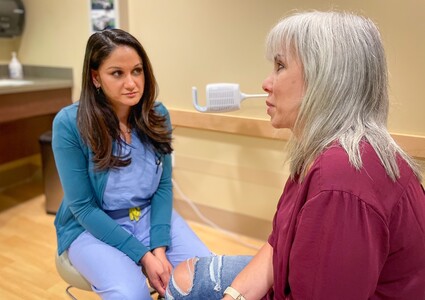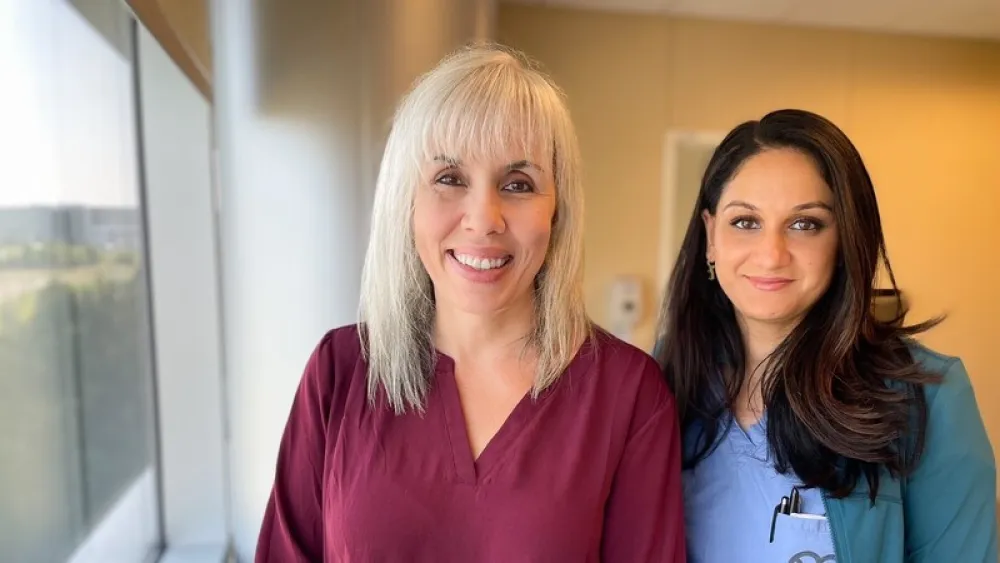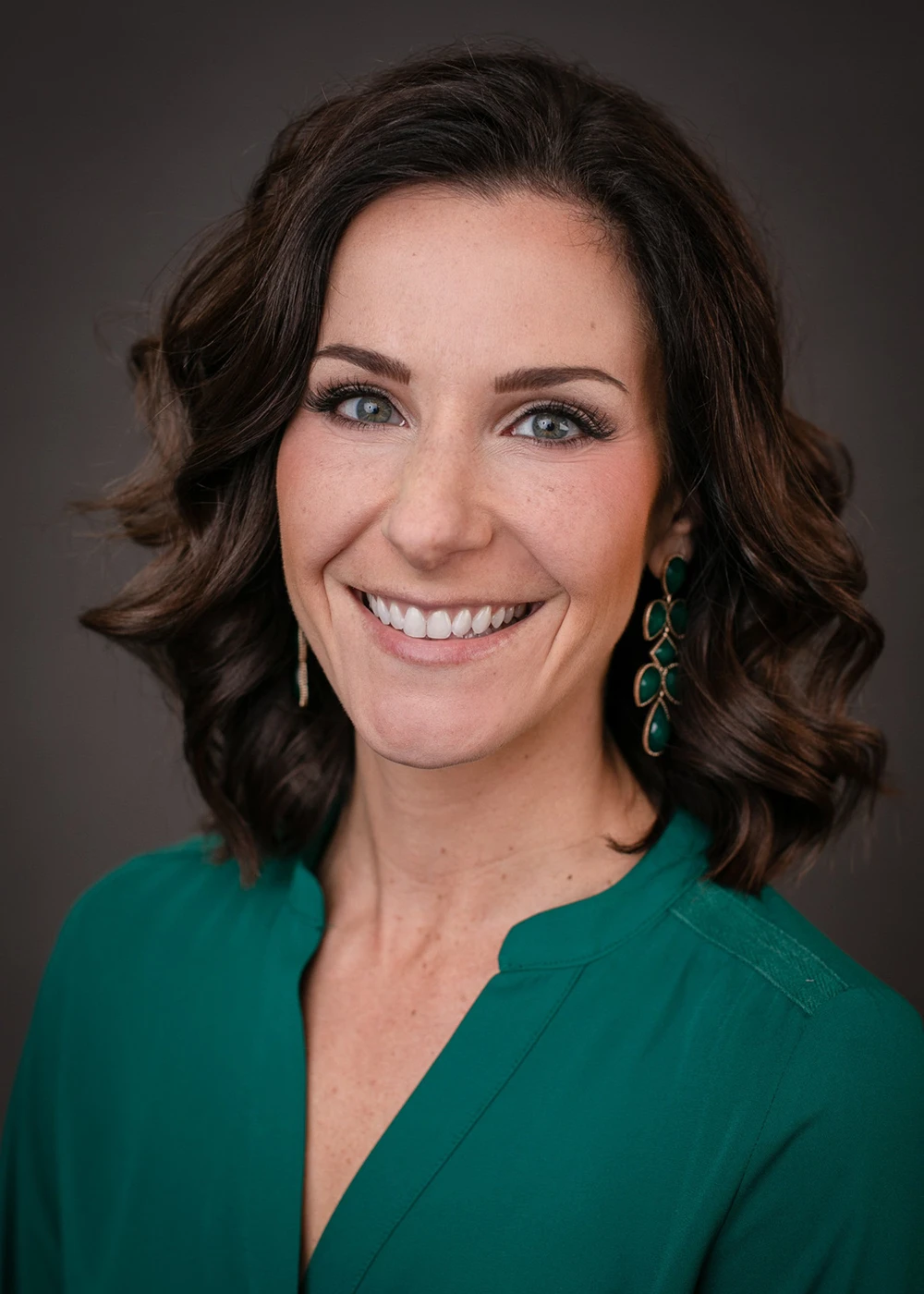





Cancer Care
‘A Divine Thing’: Methodist Restores Cancer Survivor’s Faith in the Health Care System
Published: Sept. 11, 2023

2001 began a downward spiral for Angela Kingsley’s faith in the health care system.
That’s when she was diagnosed with thyroid cancer – but only after she pushed back against care providers who assured her that her enlarged thyroid was nothing to worry about.
Although she was grateful for a full recovery, Angela said it didn’t negate all the misdiagnoses and impersonal health care encounters that she and her family experienced in the years that followed. Another cancer diagnosis in 2023 did.
An Angel in Disguise
Angela and her family moved to Nebraska from Oregon in 2016.
It wasn’t until February 2023 – after experiencing an ongoing and distressing symptom – that the 51-year-old gave health care another try.
“But I was told by this primary care doctor, ‘Oh, it’s probably bacterial vaginosis.’”
Certain it was more than the diagnosis she was given, Angela again advocated for her health and sought care elsewhere. She was quickly referred to Methodist Estabrook Cancer Center (MECC) – home to the largest gynecologic oncology clinic in the area.
Angela had uterine cancer.
“So, I made the appointment,” Angela said. “And I’ve got to tell you, it was a divine thing.”
Sitting with her husband inside an MECC exam room, Angela recalls feeling terrified – not only of a second cancer diagnosis, but also the possibility of again receiving substandard care. That’s when Methodist gynecologic oncologist Niyati Nadkarni, MD, walked in.
“I swear, when she took off her medical jacket, there were wings under there,” Angela said. “That woman is an angel.”
An Individualized Approach
Dr. Nadkarni kept the small talk to a minimum.
“And I appreciated that,” Angela said. “Because as a cancer patient, I just want to know what’s going on and how quickly you’re going to fix it.”
Almost immediately, Angela could tell Dr. Nadkarni was different from other physicians.

“She sat close to me,” Angela said. “She made eye contact. She took notes of everything I was saying. Her bedside manner was just phenomenal. And then she asked, ‘Have you ever been sexually abused?’”
It wasn’t a new question for Angela, who was molested at the age of 12. In the past, other providers had routinely asked her the same. But no provider had ever responded to Angela’s answer the way that Dr. Nadkarni did.
“She just stopped, looked at me and said, ‘My gosh, I am so sorry to hear that. How are you now? Are you OK? Do you need any counseling? We have resources.’”
Angela continued: “I made a mental note of that. It was like, ‘OK, so you’re not only worried about my physical care, you actually care about my mental and emotional well-being, too.’ It just blew me away.”
“I think anybody who’s endured that kind of trauma would want to feel heard,” Dr. Nadkarni said. “And it’s information I need to know. Because I need to know exactly what that patient needs from me and how to approach their care.”
And her approach, she added, is never the same.
“It needs to be individualized,” Dr. Nadkarni said. “Some people may come in with the same cancer, but there are different circumstances surrounding each diagnosis. No matter those circumstances, my job is to give each patient the best care possible – and that really looks different for everyone.”
For Angela, it meant a significant amount of compassion, comfort and understanding. It meant a hand-drawn illustration of exactly what was happening inside her body and answers to the questions she never had to ask. It meant a quickly scheduled and successful surgery for her stage 1, peach-sized tumor. And it meant diligent postoperative care and follow-up.
According to Dr. Nadkarni, she wasn’t alone in providing such deeply personalized care.
“It takes a really special team of people to give patients going through something so scary some peace and confidence,” Dr. Nadkarni said. “I really don’t think we’d be half as successful without the expertise and personalities you see in this clinic and hospital.”
“In the past, I’ve always felt like I was nothing more than a paycheck,” Angela said. “Providers always did the bare minimum, and I’ve always really had to advocate for what I wanted and what I felt was right. I just can’t say enough. Because of Dr. Nadkarni and her team, my faith in the health care system is restored.”
More Resources
- Learn more about gynecologic cancer care at Methodist.
- Learn more about all cancer services at Methodist.
- Read similar articles involving cancer patients and providers in our Cancer Care section.


